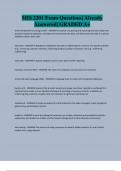MIS 2201 Exam Questions| Already
Answered| GRADED A+
Online Analytical Processing (OLAP) - ANSWER-A method of querying and reporting that takes data from
standard relational databases, calculates and summarizes the data, and then stores the data in a special
database called a data cube.
data mart - ANSWER-A database or databases focused on addressing the concerns of a specific problem
(e.g., increasing customer retention, improving product quality) or business unit (e.g., marketing,
engineering).
data cube - ANSWER-A special database used to store data in OLAP reporting.
Inventory Turnover Ratio - ANSWER-The ratio of a company's annual sales to its inventory.
structured query language (SQL) - ANSWER-A language used to create and manipulate databases
loyalty card - ANSWER-Systems that provide rewards and usage incentives, typically in exchange for a
method that provides a more detailed tracking and recording of customer activity. In addition to
enhancing data collection, loyalty cards can represent a significant switching cost.
dashboards - ANSWER-A heads-up display of critical indicators that allow managers to get a graphical
glance at key performance metrics.
analytics - ANSWER-A term describing the extensive use of data, statistical and quantitative analysis,
explanatory and predictive models, and fact-based management to drive decisions and actions.
data mining - ANSWER-The process of using computers to identify hidden patterns in, and to build
models from, large datasets.
,omnichannel - ANSWER-Providing customers with a unified experience across customer channels, which
may include online, mobile, catalog, phone, and retail. Pricing, recommendations, and incentives should
reflect a data-driven, accurate, single view of the customer.
neural networks - ANSWER-A statistical techniques used in AI, and particularly in machine learning.
Neural networks hunt down and expose patterns, building multilayered relationships that humans can't
detect on their own.
information - ANSWER-Data presented in a context so that it can answer a question or support decision
making.
knowledge - ANSWER-insight derived from experience and expertise.
big data - ANSWER-A general term used to describe the massive amount of data available to today's
managers. Big data are often unstructured and are too big and costly to easily work through use of
conventional databases, but new tools are making these massive datasets available for analysis and
insight.
data - ANSWER-raw facts and figures
row or record - ANSWER-A row in a database table. Records represent a single instance of whatever the
table keeps track of (e.g., student, faculty, course title).
column or field - ANSWER-A column in a database table. Columns represent each category of data
contained in a record (e.g., first name, last name, ID number, date of birth).
table or file - ANSWER-A list of data, arranged in columns (fields) and rows (records).
relational database - ANSWER-The most common standard for expressing databases, whereby tables
(files) are related based on common keys.
artificial intelligence - ANSWER-Computer software that can mimic or improve upon functions that
would otherwise require human intelligence.
, database management system - ANSWER-Sometimes referred to as database software; software for
creating, maintaining, and manipulating data.
e-discovery - ANSWER-The process of identifying and retrieving relevant electronic information to
support litigation efforts.
business intelligence (BI) - ANSWER-term combining aspects of reporting, data exploration and ad hoc
queries, and sophisticated data modeling and analysis.
data warehouse - ANSWER-A set of databases designed to support decision-making in an organization.
transaction processing systems (TPS) - ANSWER-Systems that record a transaction (some form of
business-related exchange), such as a cash register sale, ATM withdrawal, or product return.
canned reports - ANSWER-Reports that provide regular summaries of information in a predetermined
format.
transaction - ANSWER-Some kind of business exchange.
legacy system - ANSWER-Older information systems that are often incompatible with other systems,
technologies, and ways of conducting business. Incompatible legacy systems can be a major roadblock
to turning data into information, and they can inhibit firm agility, holding back operational and strategic
initiatives.
database - ANSWER-A single table or a collection of related tables.
machine learning - ANSWER-A type of artificial intelligence that leverages massive amounts of data so
that computers can improve the accuracy of actions and predictions on their own without additional
programming.
database administrator (DBA) - ANSWER-Job title focused on directing, performing, or overseeing
activities associated with a database or set of databases. These may include (but not necessarily be




